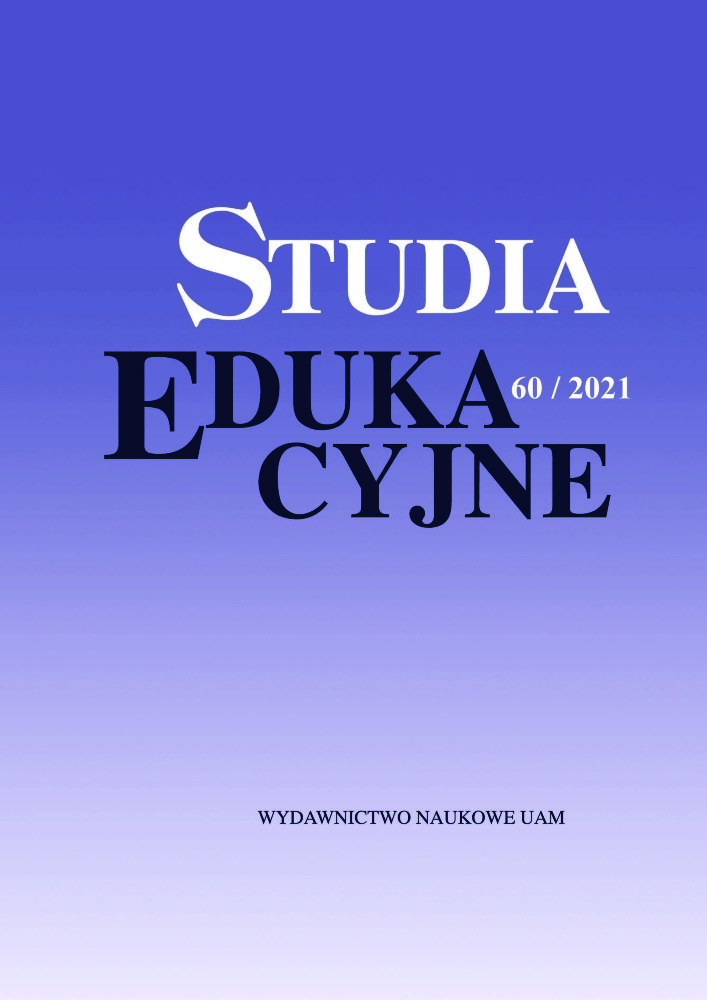Abstract
The main purpose of this analytical paper was to highlight the ideas and phenomena in Polish theatre with regard to their role in civic education, and to determine the original qualities and peculiarities of this area of education through the arts. To that end, Fernand Braudel’s the longue durée (long-term) perspective was adopted and a problematized approach to chronology was used as the principal research method, which allowed to present issues related to development and importance of this substantial trend in education through the arts, which due to its artistic and social importance surely deserves the most important place in the history of Polish theatre. What I construe as civic education theatre is theatrical realization (using a specific language) of a system of values promoting public-spiritedness (the raison d’être of any human community) which is cultivated and enhanced by a given society and which impacts the spiritual life of its members. The analyses performed have shown that this prominent trend in the Polish drama and theatre, prevailing every now and then, and willingly used until this day, abounds in specific values of enormous importance embedded in the history of the Polish culture and the Polish spirit, created by outstanding artists; it is a legacy having no equivalent in other countries. Over the centuries, it has served as the foundation of the nation’s spirituality, becoming the platform for civic political discourse, a symbol of the Polish cultural community, a means of transmitting historical tradition, a significant component of cultural identity, a substitute for social and political life, building self-knowledge and aspirations of a national community. Moreover, a concise review of historical traditions and peculiarities of civic values promoted by theatre in the Polish culture confirms the relationships between the arts and history of different nations, between Polish cultural tradition and our tragic history, between the nation’s identity and human independence in personal and social terms. The analyses are performed in the spirit of education interpreted as a totality of values promoting and protecting public-spiritedness; regarding the examined theatrical trend as the major tradition in the history of Polish theatre; fundamental belief in the national and social function of the Polish theatre; consequently, understanding contemporary theatre as the outcome of the cooperation between progress and tradition. In view of the ongoing globalization and unification processes, awareness of the uniqueness of the major trend in the history of the national theatre and irreplaceable values Polish society may contribute to the multi-cultural European community appears to be one of the major challenges faced by Polish culture and education.
References
Bednarek S., Korzeniewski B. (red.), Polskie miejsca pamięci. Dzieje toposu wolności, Narodowe Centrum Kultury, Warszawa 2014.
Bocheński T., Witkacy i reszta świata, Wydawnictwo Officyna, Łódź 2010.
Braudel F., Historia i trwanie, przekł. B. Geremek, Wydawnictwo Czytelnik, Warszawa 1999.
Brown J.R. (red.), Historia teatru, przekł. H. Bałtyn-Karpińska, Wydawnictwo Diogenes, Warszawa 1999.
Frankowska B., Encyklopedia teatru polskiego, Wydawnictwo Naukowe PWN, Warszawa 2003.
Ihnatowicz I., Naród, [w:] I. Ihnatowicz, A. Mączka, B. Zientara, J. Żarnowski, Społeczeństwo polskie od X do XX wieku, Książka i Wiedza, Warszawa 1988.
Janion M., Projekt krytyki fantazmatycznej. Szkice o egzystencjach ludzi i duchów, Wydawnictwo Pen, Warszawa 1991.
Kłoskowska A. i in. (red.), Encyklopedia kultury polskiej XX wieku, tom 1 – Pojęcia i problemy wiedzy o kulturze, Instytut Kultury, Warszawa 1991.
Kordasiewicz A., Sadura P. (red.), Edukacja obywatelska w działaniu, Wydawnictwo Naukowe Scholar, Warszawa 2013.
Kwiatkowski P.T., Odzyskanie niepodległości w polskiej pamięci zbiorowej, Narodowe Centrum Kultury, Warszawa 2018.
Lewański J., Wstęp, [w:] Teatr polskiego renesansu. Antologia, oprac. J. Lewański, Państwowy Instytut Wydawniczy, Warszawa 1988.
Miodyńska-Brooks E. (red.), Stanisław Wyspiański – studium artysty, Wydawnictwo Universitas, Kraków1996.
Osiński Z., Jerzy Grotowski. Źródło, inspiracje, konteksty. Prace z lat 1999-2009, Wydawnictwo słowo/obraz terytoria, Gdańsk 2010.
Prokop J., Uniwersum polskie: Literatura, wyobraźnia zbiorowa, mity polityczne, Wydawnictwo Universitas, Kraków 1993.
Raszewski Z., Krótka historia teatru polskiego, Państwowy Instytut Wydawniczy, Warszawa 1990.
Shils E., Co to jest społeczeństwo obywatelskie, [w:] Europa i społeczeństwo europejskie. Rozmowy w Castel Gandolfo, przyg. i przedm. K. Michalski, Wydawnictwo Znak, Kraków1994.
Sławińska I., Rodzime tradycje w dramaturgii polskiej, [w:] Wkład Polaków do kultury świata, red. M.A. Krąpiec, P. Taras, J. Turowski, Wydawnictwo Towarzystwa Naukowego KUL, Lublin 1976.
Sławińska J., Teatr w refleksji współczesnej, Wydawnictwo Literackie, Kraków 1990.
Słowiak J., Cuesta J., Jerzy Grotowski, Wydawnictwa Uniwersytetu Warszawskiego, Warszawa 2010.
Udalska E., Wielkie utopie we współczesnym teatrze polskim. Kilka uwag wstępnych, [w:] Utopie w językach, literaturze i kulturze Słowian, tom 3, red. B. Tokarz, Wydawnictwo Uniwersytetu Śląskiego, Katowice 1997.
Walicki A., Trzy patriotyzmy: trzy tradycje polskiego patriotyzmu i ich znaczenie współczesne, Wydawnictwo Res Publica, Warszawa 1991.
Ziętek A., Kultura w procesie globalizacji i integracji europejskiej, [w:] Wartości uniwersalne i odrębności narodowe tradycyjnych kultur europejskich, red. M. Marczuk, Wydawnictwo UMCS, Lublin 2004.

